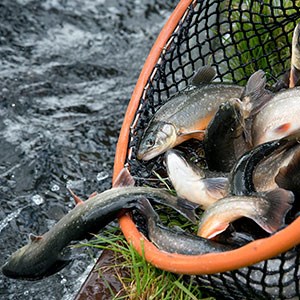Knowledge about fish health is crucial for sustainable aquaculture production of farmed fish as well as for sustainable wild populations. An expansion of fish farming in Sweden is expected, both in sea-based and land-based recirculating systems. With an intensified production comes an increased need of expertise in preventive and diagnostic fish health. SLU could provide important expert knowledge within fish health in a broad sense, but this requires investments in both research and education – are we willing and able to do this?
Topics to discuss
- Disease prevention and biosecurity - how to make use of SLU's expertise in other animal species and apply it to farmed and wild fish?
- Fish health of farmed and wild salmonid fish - common challenges?
- Fish health and diseases in other fish species (e.g. tilapia)
- Disease transmission between farmed and wild fish – what are the risks and how can they be minimized?
- How does the surrounding environment affect the health of farmed and wild fish? (environmental chemicals, algal toxins, feeds etc)
- Fish diseases linked to environmental monitoring - how can the environmental monitoring data at SLU be used as basis for research on fish diseases and disease transmission?
- Fish health linked to the reassessment of the hydropower's environmental authorization (vattendomarna) – the risk of increased spread of diseases in rivers due to removal of migration obstacles and thereby increased connectivity upstream.
- How can we strengthen education in fish health at SLU?
- Shared PhD students between faculties?
See the programme and link for registration below.
Background
Swedish fish farming is currently weighing between reducing and expanding. Some of the large producers who farm fish in open cages have problems obtaining extended permits for their operations, while a number of major investments in land-based farming (both native cold-water fish species and tropical species) are expected to give the industry a big boost.
There is an expectation from the surrounding society (authorities, industry) of SLU to step forward and provide expertise in fish health, in terms of both wild and farmed fish and the interaction between them. SLU could provide important expert knowledge within fish health in a broad sense, but we then need to make investments in both research and education – are we willing and able to do this?
